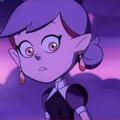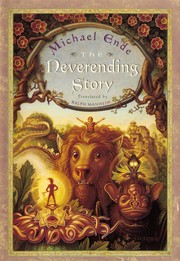Orlion reviewed The Neverending Story by Michael Ende
Review of 'The Neverending Story' on 'Goodreads'
5 stars
In America, there is pretty much one type of person that will consider reading this: those who have seen the movie. So how does it compare? Will it ruin childhood memories because of how different the book is from the movie? Or is the movie much better than the book? Ultimately, this will depend on what type of story you are in the mood for.
Both the book and the movie start out similar. Sure, Bastian is fat in the book, but he is still bullied, still has a dead mother, and still struggles in his relationship with his father. He also, of course, still steals the book. The main difference here is that the book does not set this up like the movie does. It is much more concerned with Bastian getting to the point when he reads the book than anything else. Up until the Southern Oracle portion, the book and movie moves... relatively along the same plot lines. The Nothing is different, the horse is different, Falkor is different... but based on limitations of the film medium and making an appealing adaptation, these changes are understandable and in some cases work better. However, once we reach the Southern Oracle, the book and movie only resemble each other in a bare bones sort of way. And then, a third of the way through the book, you find out that the book continues much further than the movie ever did. And for the rest of the book, Bastian plays a huge part and actually takes center stage.
It is at this point that one will realize the different focuses of movie and book. Arguably, they both depend on the character journey of Bastian... but that is mostly hogwash. In the movie, the character of Bastian is nothing more than a spectator. His entire journey is essentially him reading that book. That is it. Sure, there's this idea that man lacking imagination is destroying Fantasia, etc. etc. but the film is mostly just a whimsical story of a ten-year old who may be reading a book that is above his reading level.
In the book, Bastian has to change and struggle. He learns a message and becomes a better person, etc. And the ties between Fantastica (as it is called in the book) and are world are considerably more varied and... complex. There are several meanings to the term 'Neverending Story', imagery straight out of the prose of Jorge Luis Borges, and various other hermetic symbolism (we are even treated to a version of Crowley's "Do what thou wilt", though Michael Ende denied this was the case).
Essentially, this book, episodic and simplistic in language as children's books tend to be, is filled with very intellectual ideas. It might recognize its audience as having a limited vocabulary, but it does not decide that its audience is stupid and needs to be pandered to as such. As a result, I think it strikes that balance of being exciting and stimulating to children and providing Easter Eggs and deeper meanings for older readers (presumably the parents).
So, to recap and organize:
1) The book is more episodic than the movie.
2) The book is more ambitious than the movie.
3) Liking the movie does not guarantee that you will like the book.
4) But, they are different enough that it would not be a waste of your time.
Final verdict? Kids who have seen the movie and have those sort of expectations may struggle with the book. I do not know, I'm just kinda assuming that kids are pickier with what they like. Adults (like myself) who have seen the movie as kids and were always curious about the book will enjoy the book so long as they can divorce it from the movie. That way, each has its own special place and is not always being compared to the other.
And if you know a kid that has not seen the movie, go ahead and get them the book first. Perhaps it's time we treated children as being smarter than we give them credit for.

